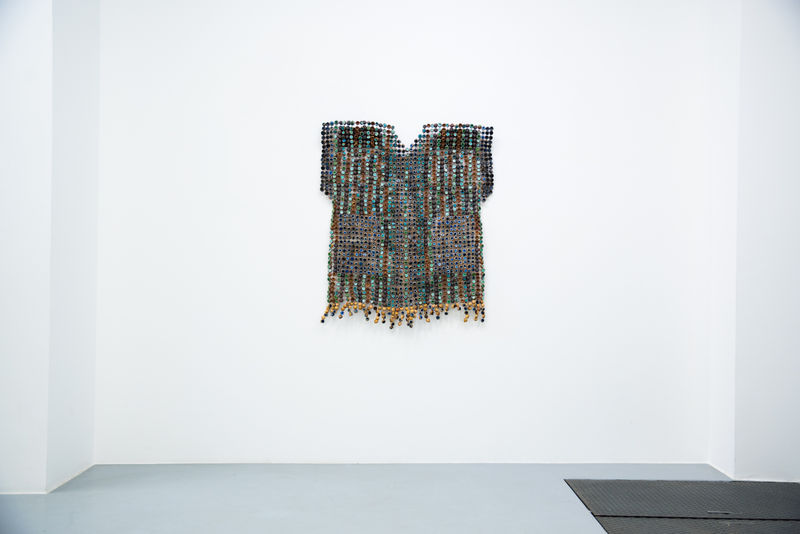When Hearts Beat with Lofty Dreams, the solo exhibition of Nigerian professor, artist and poet Ozioma Onuzulike explores the notion of social elevation and weaves the hope of a more egalitarian world. Shaped in clay, the traditional artefacts adorning the space reveal a desire to change an entrenched hierarchy.
When Hearts Beat with Lofty Dreams, the solo exhibition of Nigerian professor, artist and poet Ozioma Onuzulike explores the notion of social elevation and weaves the hope of a more egalitarian world. Shaped in clay, the traditional artefacts adorning the space reveal a desire to change an entrenched hierarchy.
In a first move, Onuzulike draws inspiration from prestigious garments and fabrics, which he materialises through a series of ceramic wall works and site-specific installations from the Palm Kernel Shell Beads series. Tendrils I and Tendrils II are different; they cascade from the ceiling. Both headdresses and tangled roots, they reinforce the idea of changing the established order.
Clothing is a symbol of belonging and a social marker. In the words of Emanuele Coccia, 'a barrier between our skin and the world', it acts as protection, the vessel for the image one wishes to reflect. Ritual, hierarchical or traditional, clothes can bear witness to a social group or practice. Onuzulike's wall tapestries arise in the shape of the universal motif of clothing. Created from the fusion of ceramic and glass beads, assembled with copper wire, Onuzulike's imperial blouses, babariga and royal shirts, sometimes in lace and alligator skin patterns, carry with them both conceptual and ornamental functions. The weight and size of these items make them unwearable adornments. Any utilitarian notions disappear, elevating them to the status of objects of power. Like precious relics preserved in a museum, protected from time, use and damage, they become the privileged witnesses of an era in the throes of mutation.
In our inner gallery room, the artist welcomes visitors with a field of yams - Seed Yams of our Land. These ceramic tubers are arranged in rows, sorted and ordered as they would be in a barn. On the other hand, presented together, they become precious bodies, as many objects of covetousness as allegories of domination. Onuzulike plays with their appearance, varying the forms and states of degradation. He sees them as a metaphor for human exploitation and violence. The Igbo ethnic group in Nigeria considers the yam a sacred and prestigious crop, a 'place of origin and nourishment'. Previously the main economic resource, healthy yam crops represented the hope of a better future for every family. Over time, however, the conditions for growing yams on the African continent have deteriorated. By quoting the loss of a traditional symbol of hope and economic success, Onuzulike wants to draw attention to the need for transformation and regeneration.
Although rooted in Nigerian and African society in general - from which he draws his references and observations - Onuzulike's reflection also resonates on a global scale. How does the way people present themselves to others speak about them as individuals? How can one escape the inevitability of one’s social condition? What are the possibilities for positive change and transformations in the world? When shall our hearts beat with lofty dreams?

